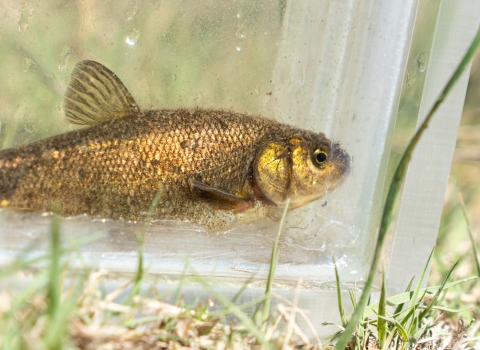ATLANTA – Following a review of the best available science, the U.S. Fish and Wildlife Service is proposing to list the Suwannee alligator snapping turtle as a threatened species under the Endangered Species Act (ESA).
The Service is also proposing a 4(d) rule which tailors protections to support the specific conservation needs of this iconic species. The Service determined that designating critical habitat for the species is not prudent since the designation could increase the degree of threat from poaching.
“The science that the Service has gathered on this turtle indicates it could become endangered in the near future,” said the Service’s Regional Director Leopoldo Miranda-Castro. “We fully understand how iconic and valuable this turtle is to the people of Florida and Georgia, and are determined to work with our partners to conserve and protect them using the best available science.”
Among the largest freshwater turtles in North America, the Suwannee alligator snapping turtle is only found in the Suwannee River basin of Georgia and Florida. There are just about 2,000 individuals throughout the range. The factors affecting its viability include illegal harvest, drowning as a result of bycatch from recreational and commercial fishing, hook ingestion, habitat alteration, and nest predation.
For a threatened species, the Service may use the flexibility provided under the ESA’s Section 4(d) to tailor take prohibitions to those that provide conservation benefits for the species – referred to as a 4(d) rule. The ESA allows for 4(d) rules that are “necessary and advisable” for the conservation of the species.
This targeted approach can reduce ESA conflicts by allowing some activities to continue that may benefit and not significantly harm the Suwannee alligator snapping turtle, while focusing efforts on the threats that slow the species’ recovery.
These customized protections of the ESA minimize the regulatory burden while maximizing the likelihood of recovery for threatened species. Detailed information on the 4(d) rule can be found in our frequently asked questions.
Any final action resulting from this proposed rule will be based on the best scientific and commercial data available. Therefore, the Service is requesting comments or information from other concerned governmental agencies, Native American Tribes, the scientific community, industry, or any other interested parties concerning this proposed rule.
The Service will accept comments received or postmarked on or before June 7, 2021. Comments submitted electronically using the Federal eRulemaking Portal (see ADDRESSES, below) must be received by 11:59 p.m. Eastern Time on the closing date. We must receive requests for public hearings, in writing, at the address shown in FOR FURTHER INFORMATION CONTACT below by May 24, 2021.
- Electronically: Go to the Federal eRulemaking Portal: regulations.gov. In the Search box, enter FWS–R4–ES–2021–0007, which is the docket number for this rulemaking. Then, click on the Search button. On the resulting page, in the Search panel on the left side of the screen, under the Document Type heading, check the Proposed Rule box to locate this document. You may submit a comment by clicking on “Comment Now!”
- By hard copy: Submit by U.S. mail or hand-delivery to Public Comments Processing, Attn: FWS–R4–ES–2021–0007; U.S. Fish & Wildlife Headquarters, MS: BPHC, 5275 Leesburg Pike, Falls Church, VA 22041-3803.
We request that you send comments only by the methods described above. We will post all comments on regulations.gov. This generally means that we will post any personal information you provide us.
More information
Jay Herrington, Field Supervisor, Northeast Florida Ecological Services Field Office; Jay_Herrington@fws.gov, 904–731–3191 or Panama City Ecological Services Field Office, 1601 Balboa Avenue, Panama City, FL 32405. Persons who use a telecommunications device for the deaf (TDD) may call the Federal Relay Service at 800–877–8339.
- Read frequently asked questions regarding this proposed listing.




